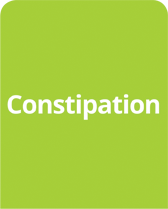Constipation
What is constipation?
Constipation is the infrequent passage (less than 3 times per week) of a hard, dry motion usually with discomfort, abdominal pain and bloating.Most patients with inflammatory bowel disease suffer with diarrhoea rather than constipation, but for a small number of people constipation may be a real problem.
Many patients who have left-sided colitis also suffer from periods of proximal constipation, i.e. constipation on the right side of the bowel. This tends to exacerbate the colitis and although it is not clearly understood why, it often settles once the bowel has been completely emptied.
What causes constipation?
One of the main functions of the large intestine is to re-absorb water from food residues which pass into it following digestion. If too much water is re-absorbed the motion becomes hard and difficult to pass.The main factors contributing towards constipation include:
- Poor diet, low in fibre-rich foods (e.g. fruit and vegetables, wholegrain cereal products.)
- Insufficient fluids, i.e. poor fluid intake and/or an over-reliance on caffeine containing and alcoholic beverages.
- A sedentary lifestyle lack of exercise coupled with a sedentary occupation can cause sluggishness of the bowel.
- Poor posture causes the bowel to become cramped.
- Conscious delay of the bowel motion. Life may be too 'hectic' to devote time to sitting on the toilet.
- Medications e.g. painkillers, antacids, antidepressants.
- Organic causes i.e. other diseases or conditions.
How is it treated?
Once organic causes have been excluded a number of approaches can be adopted for the management of constipation.1. Diet
Adjustment of the diet is the simplest approach. The greatest proportion of the diet should be made up of fruit and vegetables with whole grain cereal products (e.g. brown rice, high fibre breakfast cereals and wholemeal bread). The fibre should be sufficient enough to produce bowel motions, which are easily passed without causing pain, abdominal bloating and too much wind. Fibre intake should be increased gradually to ensure that fluid intake is adequate.2. Increased fluid intake
Adequate daily fluid intake is important in the prevention of constipation. Daily intake should be at least 1.5 litres. High fibre without extra fluids may actually increase constipation. Caffeine and alcoholic beverages may have a dehydrating effect and therefore intake should be limited.3. Adequate exercise
Lack of exercise causes the bowel activity to slow down, thus allowing more water to be extracted from the residues. If your work involves spending large amounts of time sitting or crouched over a desk, ensure that you are more active when at home. For example, where possible, walk instead of using the car, take the stairs instead of the lift and have brief, regular breaks from desk work.4. Good habits
The 'gastro-colic reflex' is the movement of the bowel in response to food in the stomach. This is a natural urge to empty the bowel and is usually strongest following breakfast. If the urge is ignored because we are too 'busy' the motion remains in the bowel where even more water is extracted making it increasingly difficult to pass. It is also important to allow sufficient time to enjoy regular meals.5. Laxatives
Laxatives are substances which stimulate the bowel to move by various actions:- Bowel irritants (e.g. senna and cascara).
These agents prevent water from being re-absorbed back into the body thus increasing the fluid in the motion and making it easier to pass.
They can also encourage water loss from the body and are therefore not recommended for the long-term as this could result in dehydration. - Osmotic agents (e.g. Epsom salts, lactulose, mannitol).
These agents work by retaining water in the intestine. High doses for long periods are generally not recommended as salt and water disturbances could occur causing an imbalance in the body. - Lubricants (e.g. liquid paraffin and glycerine).
These agents work by making the stool smoother. - Bulking agents (e.g. Linseed Grains, Fybogel, Normacol, methyl cellulose).
These agents absorb water causing a swelling and increase in the stool mass making it softer and improving the transit through the bowel. They also cause an increase and improvement of the bacterial flora of the bowel.
Bulking agents can be used quite safely on a regular basis for long periods of time. However, if the intestines have become narrow due to stricture formation, they would not be the agent of choice as obstruction of the bowel could occur.

